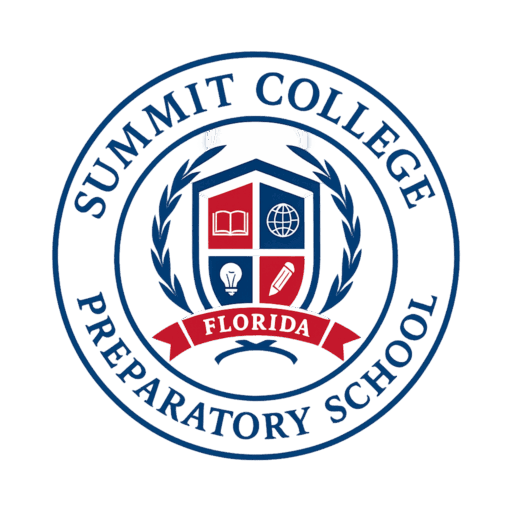English 12 (Standard)
Course Overview
English 12 is a full-year college-preparatory course for high school seniors that builds mastery in literary analysis, research-based writing, and sophisticated communication. This culminating English course is aligned with Florida B.E.S.T. Standards and College Board expectations for postsecondary readiness, with direct application to SAT performance and first-year college writing standards.
Students explore canonical and contemporary works in British and world literature while strengthening argumentative writing, critical thinking, and cross-textual synthesis. Course themes include power and authority, social justice, the evolution of identity, and ethical dilemmas in literature. Assignments range from literary essays to digital presentations, encouraging learners to articulate ideas with clarity and authority.
Throughout the course, learners apply analytical frameworks to fiction, drama, poetry, and nonfiction texts. They draft, revise, and polish extended written pieces with attention to grammar, logic, and stylistic precision. The course also includes preparation for timed writing tasks and source-based research aligned to college expectations.
English 12 culminates with a capstone research project and academic portfolio demonstrating readiness for college-level reading, writing, and discourse.
Learning Outcomes by Quarter
- Quarter 1: Analyze satire, interpret multiple perspectives in fiction, and write comparative essays on societal critique.
- Quarter 2: Trace historical development of literary movements and compose argumentative essays grounded in textual evidence.
- Quarter 3: Conduct academic research, integrate primary and secondary sources, and compose annotated bibliographies.
- Quarter 4: Present capstone projects, reflect on literary identity, and polish senior portfolios for academic and professional readiness.
Instructional Methods
Instruction includes guided literary analysis, scholarly discourse, writing workshops, multimedia tools, and Socratic seminars. Differentiated instruction ensures accessibility for diverse learners, and assessments include essays, presentations, discussions, and digital products. Feedback is formative and summative to promote continuous growth.
Assessment and Grading
| Category | Weight |
|---|---|
| Major Essays & Research Projects | 40% |
| Quizzes & Exams | 20% |
| Class Discussions & Presentations | 15% |
| Journals & Homework | 15% |
| Participation & Collaboration | 10% |
Anchor Text Justification
- Frankenstein by Mary Shelley: Explores ethics of science and identity through early Gothic literature.
- Hamlet by William Shakespeare: Engages students in tragedy, soliloquy analysis, and philosophical reflection.
- Brave New World by Aldous Huxley: Encourages debate on dystopia, societal control, and free will.
- A Room of One’s Own by Virginia Woolf: Introduces feminist literary criticism and narrative form.
- Selected contemporary nonfiction: Enhances research, argumentation, and real-world connections to thematic issues.
College Board – SAT Crosswalk
| College Board Domain | Integrated Skills in English 12 |
|---|---|
| Command of Evidence | Use of textual proof, logical structuring, and citation practices |
| Words in Context | Interpretive reading, advanced vocabulary, tone analysis |
| Expression of Ideas | Rhetorical structure, academic voice, clarity in argument |
| Standard English Conventions | Grammar mechanics, transitions, sentence variation |
Visual Elements
Sections of the course are highlighted by symbolic icons: scrolls for classics, books for comparative analysis, and quills for writing units. These visual cues structure learning and add clarity for students and reviewers.
Unit Overview
| Quarter | Unit Title | Florida B.E.S.T. Benchmarks | College Board Focus Skills |
|---|---|---|---|
| Q1 | Satire, Society, and Voice | ELA.12.R.1.1, ELA.12.R.3.1 | Theme, author’s purpose, literary commentary |
| Q2 | Literary Traditions & Movements | ELA.12.R.2.2, ELA.12.C.1.3 | Comparative analysis, historical context, critique |
| Q3 | Academic Research & Composition | ELA.12.C.4.1, ELA.12.C.5.1 | Inquiry, synthesis, MLA format, argument |
| Q4 | Capstone & Reflection | ELA.12.C.1.5, ELA.12.C.2.1 | Presentation, portfolio curation, revision |
Academic Vocabulary Matrix
| Category | Key Terms | Contextual Application |
|---|---|---|
| Literary Theory | Allusion, Allegory, Tragedy | Applied in literary analysis and comparison |
| Rhetoric & Logic | Counterclaim, Logical Fallacy, Ethos | Used in argument writing and debate |
| Research Tools | Paraphrase, Citation, Database | Practiced during research unit and capstone |
| Grammar Mastery | Subject-Verb Agreement, Modifiers | Reviewed during revision and feedback sessions |
